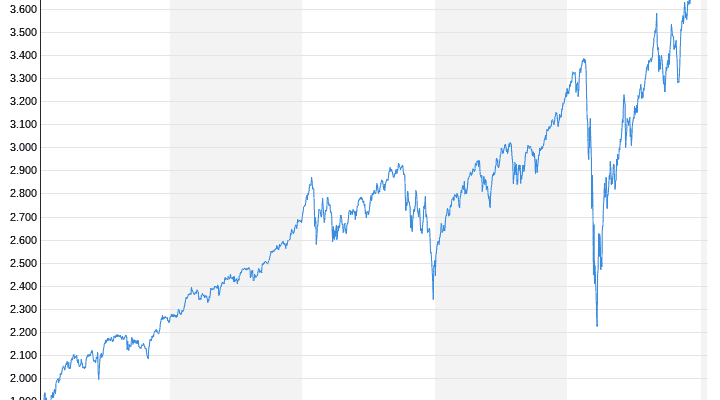Wednesday 20th January 2021
The stock market race is over
Trump is subject to Obama
From Jan Gänger
Stock prices rose sharply during Donald Trump's presidency. However, contrary to what he claims, some of his predecessors can look back on even better stock market times. Including Barack Obama.
It's official now. Barack Obama beats Donald Trump. The outgoing US President celebrated – when he was still allowed to tweet – again and again the "phenomenal" profits on Wall Street and claimed this "unique" boom for himself. But things went even better under his predecessor.
Expressed in numbers: According to the data collector Macrotrends, the US benchmark index S&P 500 climbed by almost 67 percent during the presidency of Trump. This is a proud plus that has been created since January 2017. But during Obama's first term in office it went up by around 81 percent – during his entire presidency the index even recorded a plus of 175 percent. Even Bill Clinton is ahead of Trump with a plus of about 79 percent in his first four years. Incidentally, Franklin D. Roosevelt is unassailable at the top, who achieved an increase of 206 percent in his first term in office in the 1930s. Even behind Dwight D. Eisenhower, Trump ends up in fifth place in the list of US presidents in recent history.
What does that mean? The success or failure of a presidency cannot be determined from the development of the stock market. The S&P 500 shows how investors judge the largest publicly traded companies in the United States, not how the US economy is doing. In addition, the price development on the stock exchanges has a lot to do with developments that are outside the responsibility of presidents – for example the outbreak of pandemics or a worldwide phase of low interest rates.
Things are looking up with Biden too
To put it in perspective: Obama became president when the US was in the midst of a recession. The sharply rising share prices during his first term in office were primarily a recovery after the substantial losses in the wake of the economic and financial crisis. The main reason for the long rally that followed on the stock markets is the loose monetary policy of central banks such as the US Fed, ECB and Bank of Japan. They are flooding the economy with liquidity, and interest rates in industrialized countries have been lower than ever for many years.
In October, Trump warned: If Joe Biden wins the election, Wall Street will rush into the depths. But the opposite happened. Since the November election, the S&P 500 has gained more than 12 percent. That doesn't change the fact that Trump is still claiming rising share prices for himself. Even if one blames his tax cuts and deregulations for the boom on the US stock exchanges and ignores the trade wars he instigated, the longstanding stock market boom is also taking place outside the USA. During the Trump presidency, the Danish benchmark index rose just as strongly as the S&P 500. And in New Zealand it even rose by more than 82 percent.
.
